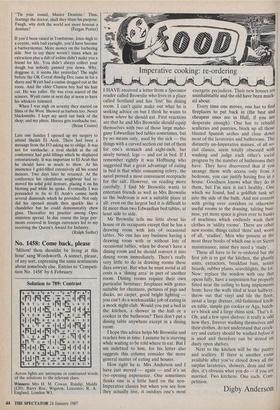Imperative cooking: re-ordering
M.„../PJOL074,00441...Ajeljj I HAVE received a letter from a Spectator reader called Brownlie who lives in a place called Scotland and has 'lost' his dining room. I can't quite make out what he is seeking advice on but I think he wants to know where he should eat. First reactions are that he and Mrs Brownlie should equip themselves with two of those large maho- gany Edwardian bed tables sometimes, but by no means only, used by the sick — the things with a curved section cut out of them for one's stomach and eight-inch, but nicely turned, legs — and eat in bed. If I remember rightly it was Hoffnung who suggested that a great advantage of eating in bed is that while consuming celery, the . navel proved a most convenient receptacle for the salt. However, on reading more carefully, I find Mr Brownlie wants to entertain friends as well as Mrs Brownlie so the bedroom is not a suitable place at all: even on the largest bed it is difficult to fit more than two Edwardian bed tables, at least side to side.
Mr Brownlie tells me little about his house or its occupants except that he has a drawing room with lots of occasional tables. No one has any business having a drawing room with or without lots of occasional tables, when he doesn't have a dining room and he should convert it into dining room immediately. There's really very little to do in drawing rooms these days anwyay. But what he must avoid at all costs is a 'dining area' in part of another room. Dining rooms require their own particular furniture: fireplaces with grates suitable for chestnuts, pictures of pigs and ducks, no carpet, good bright lighting you can't do a workmanlike job of eating in a mock night-club. Would you put a bed in the kitchen, a shower in the hall or a cooker in the bathroom? Then don't put a dining table anywhere except in a dining
MOM.
I hope this advice helps Mr Brownlie and reaches him in time: I assume he is starving while waiting to be told where to eat. But I am indebted to him, for his letter also suggests this column consider the more general matter of eating and houses.
How right he is. Mrs Anderson and I have just moved — again — and it's an eye-opening experience. One sometimes thinks one is a little hard on the non- Imperative classes but when you see how they actually live, it outdoes one's most energetic prejudices. Their new houses are uninhabitable and the old have been muck- ed about.
Every time one moves, one has to find fireplaces to put back in (the best and cheapest ones are in Hull, if you are desperate enough). One has to rebuild sculleries and pantries, block up all those blasted Spanish arches and close down most of the lavatories and bathrooms. The distinctly un-Imperative masses, of all so- cial classes, seem totally obsessed with washing and judge each other's social progress by the number of bathrooms they have. They have discovered that if you asrange them with access only from a bedroom, you can justify having five in a house. Goodness knows what they do in them, but I'm sure it isn't healthy. One which we found, had a goldfish tank set into the side of the bath. And not content with giving over corridors or otherwise useful rooms to the dousing, talcing busi- ness, yet more space is given over to banks of machines which endlessly wash their clothes in 'utility rooms'. There are other new rooms; things called 'dens' and, worst of all, 'studies'. Men who possess at the most three books of which one is on Sierra maintenance, insist they need a 'study'.
These all have to be re-ordered but the first job is to gut the kitchen, the ghastly units, extractors, breakfast bars, notice boards, rubber plants, searchlights, the lot. Now: replace the window with one that opens fully, have a suspension bar properly fitted near the ceiling to hang implements from; have the walls tiled at least halfway, throw out that vinyl and tile the floor, instal a large dresser, old-fashioned kitch- en table, simple gaS cooker or Aga, butch- er's block and a large china sink. That's it. Oh, and a few open shelves: it really is odd how they, forever washing themselves and their clothes, do not understand that crock- ery and cutlery should be washed before it is used and therefore can be stored on dusty open shelves.
Next to the kitchen will be the pantry and scullery. If there is another room available after you've closed down all the surplus lavatories, showers, dens and stu- dies, it's obvious what you do — if you are married. Two kitchens. One each. Com- petition.
Digby Anderson


















































 Previous page
Previous page